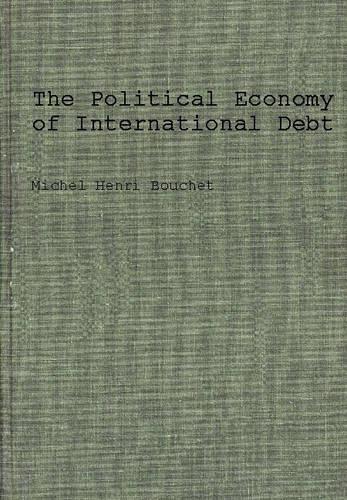
The Political Economy of International Debt: What, Who, How Much, and Why
(Hardback)
Publishing Details
The Political Economy of International Debt: What, Who, How Much, and Why
By (Author) Michel Bouchet
Bloomsbury Publishing PLC
Praeger Publishers Inc
4th December 1987
United States
Classifications
Tertiary Education
Non Fiction
336.3435
Physical Properties
Hardback
238
Description
This original work combines technical analysis of the North-South, Third World debt crisis with a description of the political frameworks used to analyze this issue. . . . Business professionals who want a deeper understanding of the debt question, as well as scholars of international banking and economic development, can use this book as a roadmap toward understanding the assumptions behind debt analysis, as well as a way to frame more clearly the issues associated with efforts to resolve this lingering international economic problem. International Executive In this book, Dr. Bouchet, a leading economist and banker who has more than ten years' direct experience in the international lending process, cuts through the confusion that surrounds the subject. His clear and original analysis delineates the debt situation in terms of the behavior of the major participants, their conflicting motivations, and the external pressures and theoretical frameworks that determine their roles and actions. A wealth of previously unpublished data and the author's constructive synthesis of these disparate elements will enable professionals, scholars, and students to develop more realistic approaches to this intractable problem.
Reviews
Bouchet, a highly qualified research economist with central bank and government experience working with debt issues, has written a comprehensive, readable summary of approaches to the debt problem. This includes clear and critical analyses of the process banks use to assess country risk; the approaches of the official agencies; the functionalist theory of development; the traditional Marxist approach; and dependency theory. He discusses the underlying paradigms and assumptions and evaluates their strengths and weaknesses. Bouchet concludes with his own eclectic proposals for dealing with the debt crisis, emphasizing that no quick fix will work and that no single response will be sufficient. This book differs from other studies in emphasizing different philosophical approaches, rather than expressing a particular viewpoint of focusing on the conflicting interests of the involved parties. The book contains a useful selected bibliography, a good index, chapters-endnotes, and relevant supporting documents. This balanced analysis provides a superb introduction to the conflicts raging over this serious problem and should be of interest to economists, students, and practitioners trying to understand the broader picture.-Choice
"Bouchet, a highly qualified research economist with central bank and government experience working with debt issues, has written a comprehensive, readable summary of approaches to the debt problem. This includes clear and critical analyses of the process banks use to assess country risk; the approaches of the official agencies; the functionalist theory of development; the traditional Marxist approach; and dependency theory. He discusses the underlying paradigms and assumptions and evaluates their strengths and weaknesses. Bouchet concludes with his own eclectic proposals for dealing with the debt crisis, emphasizing that no quick fix will work and that no single response will be sufficient. This book differs from other studies in emphasizing different philosophical approaches, rather than expressing a particular viewpoint of focusing on the conflicting interests of the involved parties. The book contains a useful selected bibliography, a good index, chapters-endnotes, and relevant supporting documents. This balanced analysis provides a superb introduction to the conflicts raging over this serious problem and should be of interest to economists, students, and practitioners trying to understand the broader picture."-Choice
Author Bio
MICHEL HENRI BOUCHET has served as a country risk analyst with the Office of the Prime Minister in France and with the Banque Nationale de Paris. More recetly he was Senior Economist with the Institute of International Finance in Washington, D.C.
